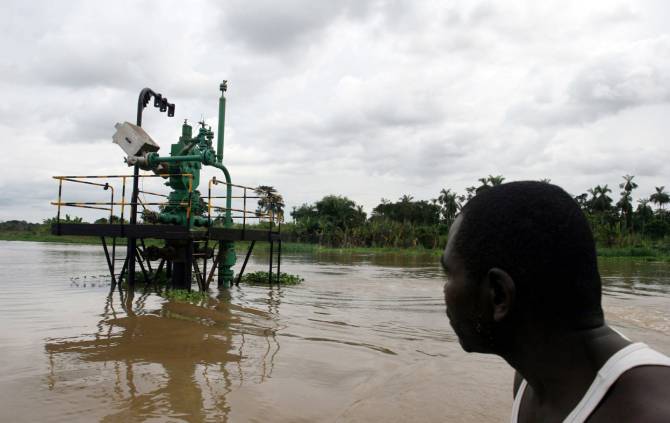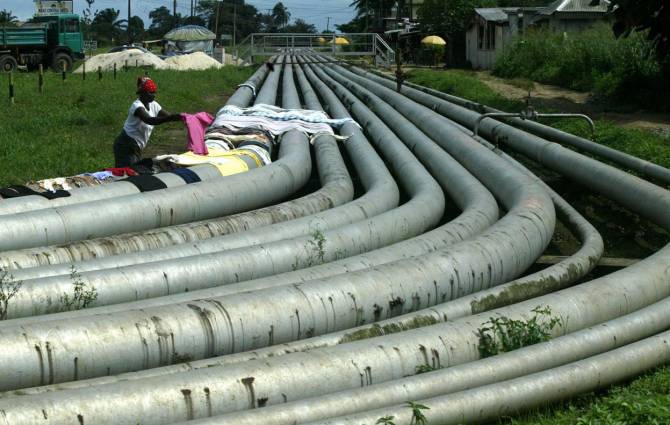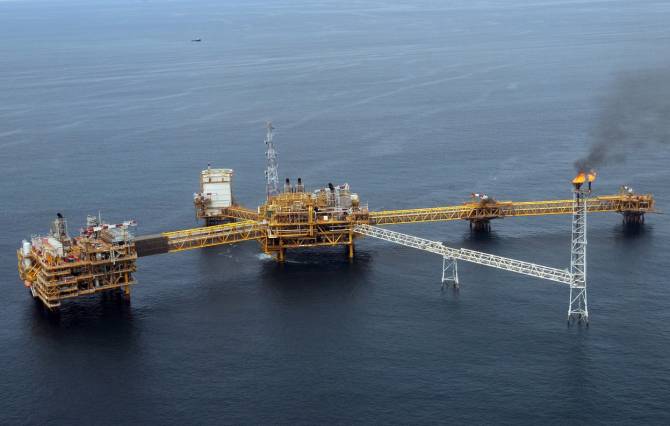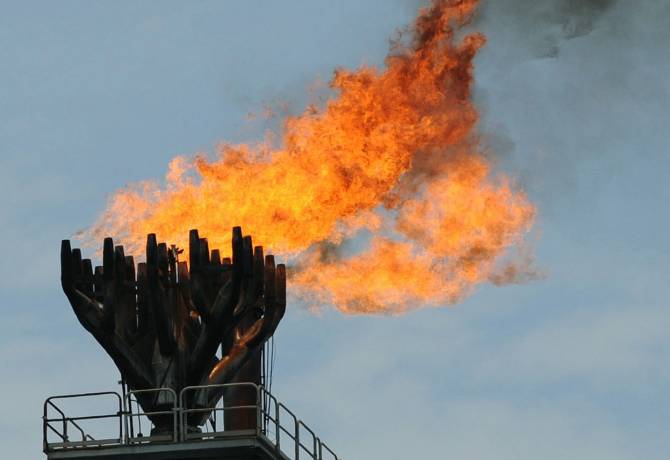For the past 50 years, many hydrocarbons, namely oil and gas in Nigeria (Niger Delta) is the key to being a select few, and at the cost of local people and the natural environment.

In the list of the world's largest oil producer, Nigeria is in eighth place, but it still remains one of the poorest countries in the world. About 70% of its 150 million people live below the poverty line. Local nature also have to pay for the production of "black gold." Approximately 500 million gallons of oil, vylivshihsya for this time in the Niger Delta - the same way as if the accident took place annually from oil tankers «Exxon Valdez».

Oil flows around submerged boat in the bay about illegal oil refinery in Ogoniland near Port Harcourt in the Niger Delta.
The local disaster, there are many reasons: poor quality equipment and poor maintenance, lack of respect, militant attacks, "oil pirates," not to mention the unstable government and official misconduct. According to WikiLeaks, the company "Shell Oil" introduced their staff in all the main ministries of Nigeria, thus having the opportunity to influence key government decisions. For these photos can partially imagine how coexist country Nigeria and the oil and gas industry.
The city of Warri woman carries tapioca seeds, which it is dried before the fire, a gas torch.
Children swim past the oil pipe to the house in the village of Andoni in the Nigerian state of Rivers.

Aerial photography, which has the obsolete oil field facility and patches of oil spilled in the mangrove swamps near the city of Warri.
A man looks at an oil well on the River Nun in the Niger Delta.
A woman lays things out to dry on the pipes of the pipeline passing through the area Okrikans near Port Harcourt.
Aerial view of an oil platform in the company's Total Ameneme, 35 kilometers from Port Harcourt.

Gas flaring at oil rig company Total. Gas flaring - a common practice in the oil industry in this way get rid of the gas that can not be used or transported. Excessive burning of waste and is doing great damage to the environment, as this large amount of toxic and greenhouse gas emissions that cause health problems in humans and affect the climate.
Nigerian oil companies flare the second largest amount of natural gas in the world. In 2008, there burned about 15.1 billion cubic meters, or roughly 70% of the gas extracted in that year. The use of torches so widespread that in the night shot of the Earth taken by NASA, the Niger Delta brightly lit (bottom left). Nocturnal activity torches from 1994 to 2007 as can be seen in the film, presented by the National Oceanic and Atmospheric Administration (NOAA). (Submitted photo was taken from NASA maps, created by Robert Simmons, based on data from monitoring devices Programs defense and meteorological satellites, processed Geophysical Data Center of the National Oceanic and Atmospheric Administration).
Oil facilities with two burning torches (top left) near Ogbogvu, Nigeria.
Flaring of natural gas at oil facilities owned by an Italian company in the Abama in the Nigerian state of Bayelsa.
Nigerian child silhouette on a background of the gas flame on the oil facility of Royal Dutch Shell in the Niger Delta.
Illegal oil refinery in Ogoniland near Port Harcourt. "Oil pirates", in the local parlance called "tsisternikami", for many years an integral part of Africa's oil and gas industry. They punched holes in the pipes and bring Nigerian and foreign oil companies in the annual loss of billions of dollars.
Illegal oil refinery in Ogoniland.
Barrels of oil and oil-soaked land in an illegal oil refinery in Ogoniland near Port Harcourt in the Niger Delta.
Smoke rises from an illegal oil refinery in Ogoniland.
Canoeing in the backwater in Ogoniland, through which oil is stolen for illegal oil refinery.
The operator removes the mangroves near Bodo City, destroyed by the oil spill.
Oil spill in the Gulf near the fire.
Man stirs the water in the river to show the oil spill.
Boy in a canoe holding the hose, ready for pumping oil from the place where it leaks into the river in the Ogoni region of the Niger Delta.
Aerial view of village on the island near the site of the oil spill in the fire.
In Kegbara Dere child looks at the abandoned oil wells with the oil spill.
Oil port base in Bonny, through which most of the oil produced in the Niger Delta.
Oil and gas terminals of Royal Dutch Shell Bonny Island in the Niger Delta.
Local residents stand around manifold subsidiary Royal Dutch Shell in Bodo City.
Fire rages on wooden boats to oil captured by the military in Andoni in the Nigerian state of Rivers. Joint Task Force, made up of various military units, capture a barge with a large quantity of stolen oil. Boat on which thieves pumped oil from pipelines, were burned.
Spilled oil in the swamps surrounding the village of Bodo in Ogoniland in Rivers State, where the Nigerian representative of Shell Petroleum Development Company.
The smoke from the burning oil behind women. Pipeline near the town of Kegbara Dere, 55 km from Port-Harcourt, caught fire two weeks ago.
Police and officials stand on the remains of a skeleton near a gas pipeline exploded in the coastal village 45 kilometers east of Lagos. The gas flow out of the cracked pipeline exploded while trying to evacuate residents free fuel. In the resulting fire killed about 200 people, whose charred remains were scattered in the surrounding area.
Комментариев нет:
Отправить комментарий